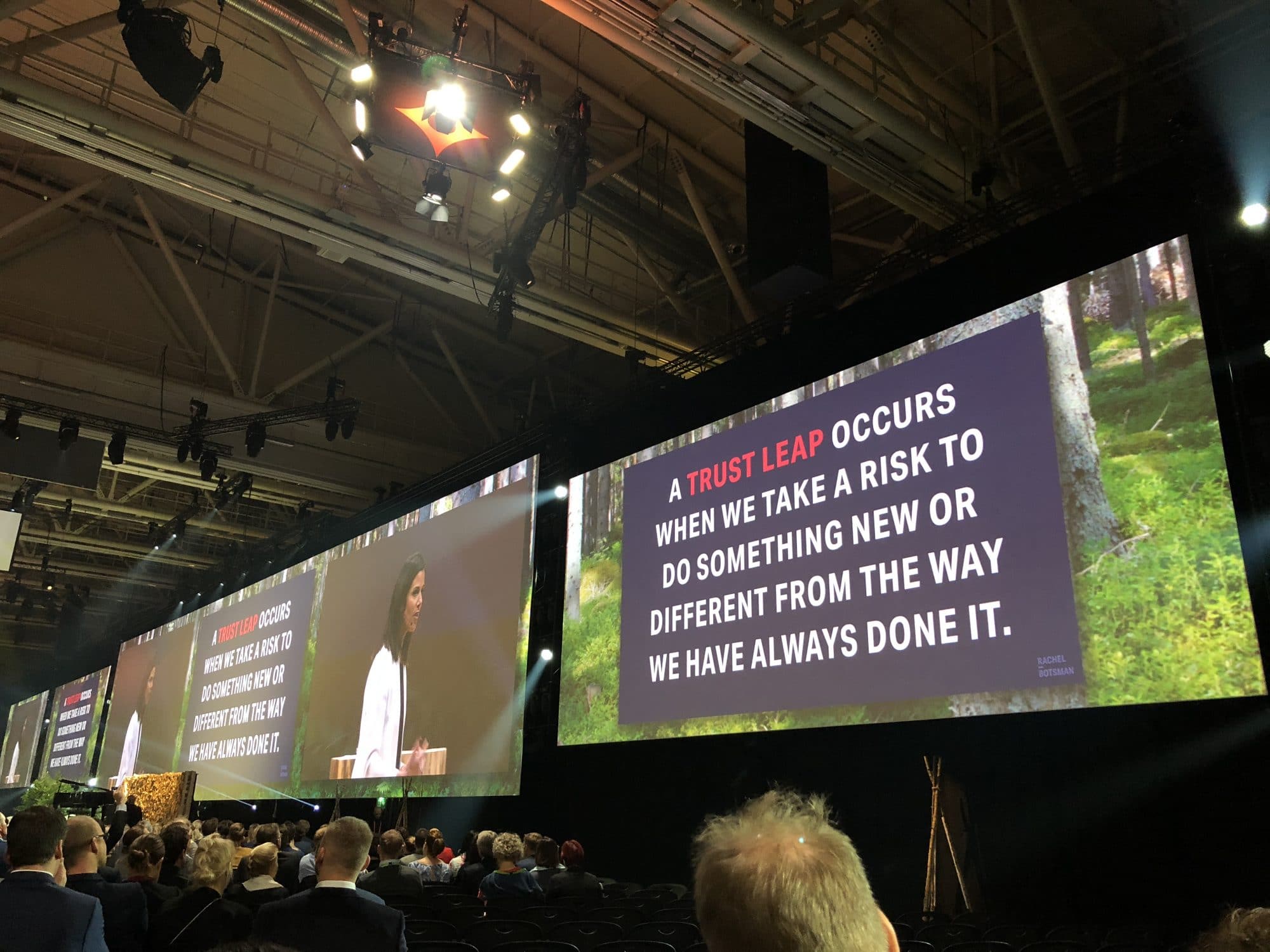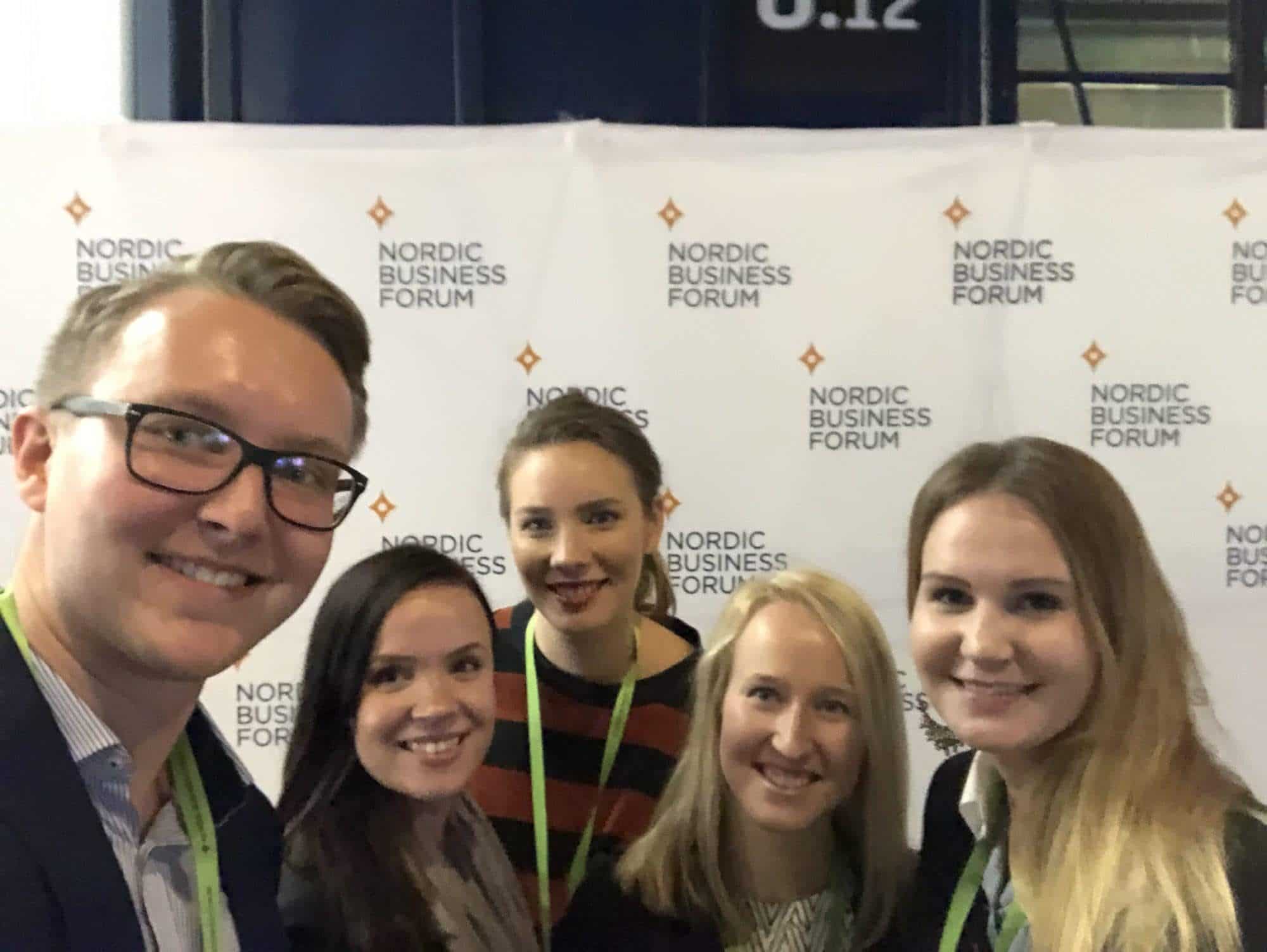Last week we attended the Nordic Business Forum 2017. This year it was all about responsibility, leadership and purpose – themes very meaningful also for our team. This year was also a bit special as Anna and Petra attended the conference for the first time. Instead of explaining what the conference was all about (you probably know already anyway), we decided to collect thoughts from the team about their favourite learnings and ideas they want to apply to our own work.

What did you learn?
Salah:
To me, the most interesting and relevant speaker was Patrick Lencioni who had a very interesting talk about Organizational Health. I found it to be a very concrete topic as well as an important one. To us at Agile Search who are developing our Employer Branding services more and more, this was great added information about what problems can be observed at the highest levels of an organization and how to tackle them.
In general, NBF 2017 was a great opportunity to reflect more on the themes of the forum: responsibility, leadership and purpose. For me, as a founding partner, these topics are always great to reflect upon and stay grounded as well as in tune with the original ideas that made me and my business partner (Fredrik Raynal) start a company based on our vision and values.
Anna:
One of the interesting points came from the first speaker, mr. Garelli, who approached competitiveness from economics theory -perspective. In his opinion, the changes in society are now affecting companies more than the changes in management. His point was tough to swallow with my background in leadership psychology, however, he may just be right. In the end, I guess it’s up to everyone who considers themselves a leader, to adapt and innovate in order to keep up with the societal changes.
Sofia:
I really loved Rachel Botsman’s prediction that trust will be the new currency of the world. We are shifting from transactions to interactions, and that efficiency kills trust, because trust really requires friction. She also told us that institutional trust wasn’t really designed for the digital era, but we are going towards distributed trust. How can we then avoid being like Uber and take the responsibility over the fuck-ups? Let’s be proactive and reduce the risk that something would really happen with our platform or product and then if and when something happens, let’s be there and take care of the issue.
Saku:
Patrick Lencioni’s talk on the five dysfunctions of a team hit home for me. As he kept repeating himself, it’s not necessarily something new, but a good reminder on how and relationships and dynamics work in an internal team, as well as with clients. Everything begins with trust, without which it’s not possible to have a healthy team or relationship with a client. By having vulnerability-based trust, you can open up and say “hey, I’m human too” instead of having all the answers.
Laura:
Although Will Smith’s interview focused mostly on his career, he had one point that really affected me and inspired me to try and change my own behaviour. It was about fear. I’d apply this to also nervousness, as at work fear is a bit of an overstatement. Anyhow, we spend enormous amounts of time being afraid before anything scary has even happened. It might not in fact happen at all.
So, we end up wasting time, in a perfectly safe situation, being afraid of something that only might happen in the future. And then in the very situation we’ve been anxiously waiting for, we often find ourselves calm. I’m not a very nervous person but I do have my own fears, and as a recruiter I often meet people who might be nervous about interviews, or team meetings, or tests evaluating their skills. This thought mr. Smith shared with us is, when you think about it, almost self-evident but I’m sure also something we all tend to often forget.

What were you expecting?
Anna:
I watched NBF’s live stream last year, so I had an idea what the speeches are like. I was mainly hoping for chances to meet cool people. The theme tables were excellent for this purpose!
Petra:
Theme tables were nice, low barrier to get to network with relevant people.
Sofia:
I was especially interested in the leadership track this year, and it was great! But what I really appreciated was how a business conference like Nordic Business Forum can also get business leaders to take responsibility over global issues like the warming of this planet.
What will you apply to Agile Search?
Laura:
I found Rachel Botsman’s keynote about trust highly interesting, but also very applicable. Patrick Lencioni touched the same topic from a bit different angle, discussing dysfunctional teams and reasons behind them. As we are a company that has been growing quite fast in the recent years, I think it’s especially important to think of these things now when the team size is still fairly small, we work closely together and it’s easy to change things. After the team size reaches a certain limit, its often a different playground. If the base is strong and built with right blocks, continuing success later on will be much easier.
Saku:
A big theme in many of the presentations was the idea of overcoming your fears, and just going for what you want to achieve. Whether it’s starting your own company, picking up the phone again after the 20th “no”, or jumping out of an airplane (with a parachute), the fear and anxiousness is the worst before you take the plunge. Instead of being anxious over something I haven’t yet even tried, I’ll continue to push myself to improve, and do the things I’m nervous of or scared to do. That’s the only way to truly push through the mental limits we all set for ourselves.
Anna:
As a recruiter I find mr. Grants point about diversification vs. culture fit very interesting. To summarize, research has shown that culture fit is mainly important in a slowly growing startup, but as soon as the company really starts focusing on recruiting, diversification is better. This prevents groupthink-phenomena, and thus often leads in better decisions. So in Grant’s words, when you are recruiting, immediately when you see a pattern of “we like this kind of people” it is best to start hiring some other kind of people. I would want to coach our clients on this.
As an informal leader, I want to follow mr. Lencioni’s advice in creating a smart and healthy organization. It all starts with trust, which is build by showing your vulnerability, admitting your mistakes and the fact that you don’t have all the answers. The Second building block for healthy organization is to embrace conflict. I know it will be hard for me personally, but I want to become the person who also tells others if they need to change their behavior or if we have to approach an issue differently.
Salah:
I have always been a believer in the power to do great things by combining hard work, grit and an ounce of intelligence (everybody that knows me will tell you that I’m not the sharpest knife in the drawer), but when I saw Nick Vujicic speak – a man born with no arms or legs – I understood just how important it is to never give up on your goals while still remaining grateful for what you have.
At Agile Search, the most fulfilling part of my job is really to see our colleagues further-develop, succeed and flourish. To make everybody part of building this company and investing more in our people will be my next big challenges at Agile Search for this year to come.